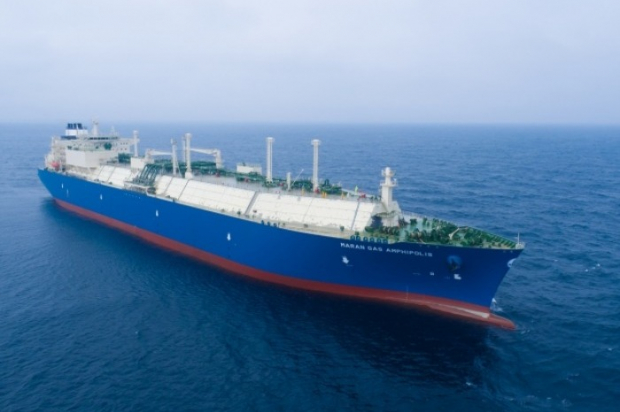Shipping & Shipbuilding
Daewoo to develop offshore carbon capture tech with ABS, GasLog
The shipbuilder will install the carbon capture and storage system in the four LNG carriers that GasLog ordered
By Jun 10, 2022 (Gmt+09:00)
1
Min read
Most Read
LG Chem to sell water filter business to Glenwood PE for $692 million


KT&G eyes overseas M&A after rejecting activist fund's offer


Kyobo Life poised to buy Japan’s SBI Group-owned savings bank


StockX in merger talks with Naver’s online reseller Kream


Meritz backs half of ex-manager’s $210 mn hedge fund



South Korea’s major shipbuilder Daewoo Shipbuilding & Marine Engineering Co. (DSME), said on Friday it will join forces with marine asset classification body America Bureau of Shipping (ABS) and Greek shipping services provider GasLog for offshore carbon capture and storage (OCCS) technology.
The three parties signed an agreement at Posidonia, an annual shipping exhibition held in Greece, for the co-development of OCCS. OCCS is a green technology designed to absorb some carbon dioxide emission from vessels, store it as a byproduct inside the ships and safely dispose of it onshore.
Under the agreement, DSME and GasLog will design and install OCCS in four liquefied natural gas (LNG) carriers that the Korean shipbuilder will construct and deliver to the Greek company in 2024 and 2025. GasLog awarded orders for the four 174,000 cubic-meter-LNG carriers to DSME last December.
The Korean shipbuilder owns core technologies and patents related to OCCS via partnerships with local equipment providers. It will conduct a comprehensive review of the OCCS equipment designs, share the related technologies and floor plans with the Greek company as well as check the validity of OCCS management.
ABS will advise on the OCCS development and evaluate the general quality of the carrier. DSME aims to win ABS’ approval in principle (AiP), a certificate of new technology complying with the US ship classification society’s rules and guides. To receive AiP, DSME will take a risk assessment on ship management and quality verification once the carriers are constructed.
Korean shipbuilders are stepping up their carbon capture technologies for vessel management. Earlier this week, shipbuilding giant Hyundai Heavy Industries Group and shipping firm Hyundai Glovis Co., said they will develop the world’s largest liquefied carbon dioxide (LCO2) carrier with three partners, Korean ship manager G-Marine Service Co., ABS and the Republic of the Marshall Islands. Hyundai Heavy Industries is also aiming to receive ABS’ AiP certificate.
Write to Kyung-Min Kang at kkm126@hankyung.com
Jihyun Kim edited this article.
More to Read
-
 Shipping & ShipbuildingHD Hyundai files complaint against EU's veto of DSME merger
Shipping & ShipbuildingHD Hyundai files complaint against EU's veto of DSME mergerMar 28, 2022 (Gmt+09:00)
4 Min read -
 Mergers & AcquisitionsDaewoo Shipbuilding to look for domestic buyer: KDB
Mergers & AcquisitionsDaewoo Shipbuilding to look for domestic buyer: KDBJan 28, 2022 (Gmt+09:00)
2 Min read -
 Shipping & ShipbuildingDaewoo Shipbuilding, Samsung Heavy win LNG carriers order from Qatar
Shipping & ShipbuildingDaewoo Shipbuilding, Samsung Heavy win LNG carriers order from QatarNov 08, 2021 (Gmt+09:00)
1 Min read -
 Shipping & ShipbuildingDaewoo Shipbuilding tops 2021 order target
Shipping & ShipbuildingDaewoo Shipbuilding tops 2021 order targetSep 14, 2021 (Gmt+09:00)
1 Min read
Comment 0
LOG IN


